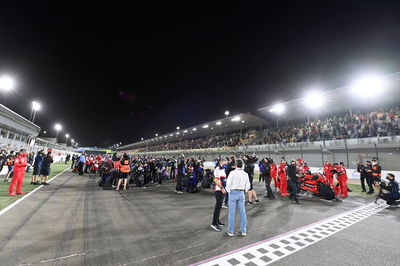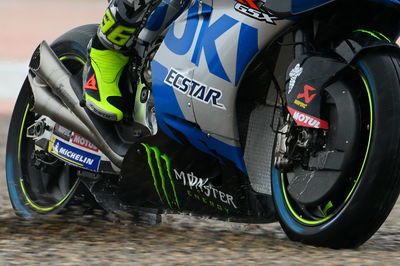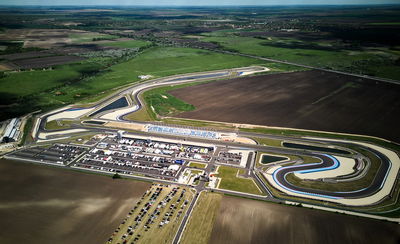MotoGP amends sporting, technical, medical & disciplinary rules

The latest meeting of the Grand Prix Commission has resulted in a range of rule amendments being passed for the 2022 season and beyond.
The full text can be seen below but in summary the sporting rules now include a tighter minimum qualification time of 105% rather than 107% of the fastest lap, plus confirmation of the new Moto3 and Moto2 minimum ages for 2023.
The technical rules include an official procedure for checking MotoGP ride-height systems, drawings alone will no longer be sufficient for aerodynamic homologation, a larger 355mm Brembo front brake size is being added alongside the existing sizes in the MotoGP allocation, while 'any part of the equipment that is deemed to be purely for the purpose of aiding rider’s aero effect is not permitted' (might this include helmet spoilers?)
The medical regulations have been strengthened in terms of passing a rider fit to return to competition. 'Specifically, there are new requirements on evidence that must be considered when reviewing recovery from head injury and concussion, abdominal/thoracic injury and musculoskeletal injuries, (such as fractures requiring surgery, compound or complex fractures).'
Finally, the disciplinary changes mean a new position has been approved for 'the assessment of regulation infractions, for example, jump starts, track limits, etc. Such persons will henceforth be referred to as Judges of Facts'. Such decisions will no longer be subject to appeal…
FIM Grand Prix World Championship
Decisions of the Grand Prix Commission
The Grand Prix Commission, composed of Messrs. Carmelo Ezpeleta (Dorna, Chairman), Paul Duparc (FIM), Herve Poncharal (IRTA), Lin Jarvis (Yamaha – MSMA) and Paolo Ciabatti (Ducati – MSMA) in electronic meetings held during November and December 2021, made the following decisions:
Sporting Regulations
EFFECTIVE IMMEDIATELY
Qualification for the Race
In all classes the rider must achieve a time at least equal to 105% of the time recorded by the fastest rider in the same session in any of the FP or QP sessions. (Previously 107%).
Minimum Ages
The Commission ratified the previously announced changes to minimum ages for participation.
Licences for riders are issued only when the minimum age has been attained as below:
• Moto3: 16 years (18 years in 2023)
• Moto2: 16 years (18 years in 2023)
• MotoGP: 18 years
In the Moto3 class, an exemption applies to the winner of the FIM Moto3 Junior World Championship or the Red Bull MotoGP Rookies Cup to compete in the Moto3 class of the FIM World Championship Grand Prix as a contracted, wild card or substitute/replacement rider even if the rider has not reached the minimum age for the class (however a minimum age of 15 years in 2022, 16 years in 2023, then 17 years in 2024 will apply).
In order to ensure a smooth transition, an exception will be granted to the riders who started in the 2022 Moto3 World Championship at the age of 16 so that they can continue with the 2023 Moto3 World Championship.
For Moto2 and Moto3 substitute or wild card riders in 2022, the minimum age is 17 years.
Technical Regulations
EFFECTIVE IMMEDIATELY
MotoGP Class
A procedure for checking machines equipped with passive ride height systems was approved.
Previously teams were required to deliver to the Technical Director, at the first event of the season, samples or detailed drawings of their aero body parts. For 2022 machines teams will now be required to provide samples or full 3D CAD models of these parts. Homologated aero body parts from 2021 machines, still used in 2022, will continue to be checked as per current procedures.
Following a request from Brembo, supported by MSMA, the following regulations will now apply to brake dimensions and packages.
Carbon brake discs must be one of the permitted sizes for outside diameter, which are: 320mm, 340mm and 355mm.
At certain circuits, for safety reasons, the use of 340mm or 355mm carbon brake discs is mandatory for the race, if declared Dry by the Race Director.
The circuits currently listed for mandatory minimum size 340mm brake discs are: Motegi (Japan), Spielberg (Austria) and Buriram (Thailand).
At these circuits either 340mm or 355mm discs may be used.
There are no restrictions on brakes disc sizes in a race declared Wet.
To reflect these changes there will now be two alternative brake packages defined in the regulations which must be supplied at a maximum cost of €80,000.
Option 1 (Current) | Option 2 (New) | ||
Calipers | 3 left + 3 right | 2 left + 2 right | |
Master Cylinder | 3 | 3 | |
Carbon Disc | 10 | 10 | |
Pads | 28 | 32 | |
Moto2 Class
It will be permitted to add ducts to the front fender for the sole purpose of cooling the brake system and discs. All ducts must be pre-approved before being used on track and the decision of the Technical Director will be final.
Moto3 Class
The following items will now be designated as Performance Parts and must be homologated:
Complete motorcycle wiring loom (including wiring connections to airbox, dashboard, throttle body, handlebar switch panel and kill switch).
Complete fuel pump assembly from fuel pump to throttle body (including all connectors and hoses).
Pressure Regulator.
Riders Safety Equipment
The only purpose of any part of the rider’s race suit, boots and gloves should be to ensure that the rider is protected in an incident. Therefore, any part of the equipment that is deemed to be purely for the purpose of aiding rider’s aero effect is not permitted. The decision of the Technical Director will be final when determining what constitutes aero only.
Medical Regulations
Medical Fitness to Race
The Commission approved a number of new regulations concerning the medical assessment conducted to permit return to competition.
Specifically, there are new requirements on evidence that must be considered when reviewing recovery from head injury and concussion, abdominal/thoracic injury and musculoskeletal injuries, (such as fractures requiring surgery, compound or complex fractures).
In case of doubt, the CMO, the MotoGP Medical Director and the FIM Medical Officer can request further opinion on the reports and evidence provided to determine the status of the rider (fit or unfit).
Rider Helmets
The helmets of all riders taken to the medical centre for assessment following a crash must be retained by the medical personnel or CMO for control by the Technical Director or Technical Stewards before being returned to the rider or the team manager.
In cases of head injury including concussion or loss of consciousness, unless a specific provision of a national law advises otherwise, the helmet must be forwarded to the FIM Laboratory at the University of Zaragoza for expert examination and non-destructive analysis.
The helmet manufacturer will be notified of the exact tests and has the right to approve or refuse. They will be able to attend the analysis carried out in this laboratory. After inspection, the helmet can be returned to the rider, team, or manufacturer.
Disciplinary Regulations
A new position was approved for those persons involved in the assessment of regulation infractions, for example, jump starts, track limits, etc. Such persons will henceforth be referred to as Judges of Facts. No appeal may be lodged against a decision of the Judges of Facts on matters within their competence.
It was confirmed that information on protests and appeals plus Decisions of the FIM MotoGP Stewards Panel taken during track activities (practice and races), may be communicated on monitors as well as on official notice boards. Such communications on public screens are considered valid notification












